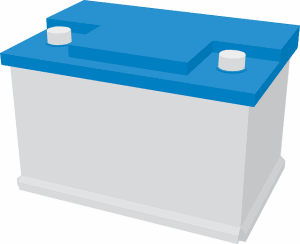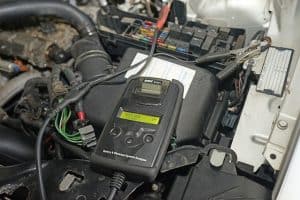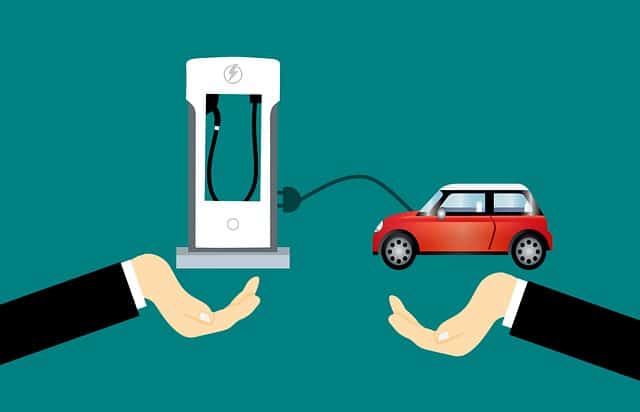Last Updated on May 10, 2023 by Chase Manhattan
Do you have problems with charging your car battery? Well, issues with the car battery are one of the most common problems that car owners have. To find out whether you can fix your car battery, you need to know why it’s not charging anymore. Why is my car battery not charging?
A car battery won’t charge for a number of reasons. The battery could be damaged or too old. The alternator may be faulty. The belt on the alternator may not be working. A car battery won’t charge because of bad terminals or a blown fuse as well.
Check out this thorough guide where we examine all the reasons why a car battery won’t charge. We’ll also explain how to fix your charging problems. If you’re new to car batteries, I recommend understanding the proper levels of voltage in a car’s battery.
Quick Navigation
Bad Battery

The first thing to check out is your battery, obviously. We have a lot of guides here that explain some of the problems that can occur with car batteries. Nonetheless, we’ll still go through the same thing here.
- Car batteries don’t last forever, they die of old age even if maintained perfectly. When they reach a certain age, the battery loses its capacity and it won’t be able to charge anymore. As the battery ages, it charges less and less.
- Damage can ruin a battery’s ability to charge as well. Corrosion and changes in the electrolyte solution affect how the battery is charging.
- Spillage of the electrolyte solution can also stop a battery from charging. Most flat acid batteries can spill when tipped over.
It’s quite easy to find out if your battery is experiencing any of these problems. The best thing to do is run a test with a multimeter(battery tester). By running a test, you can find out whether the battery is not holding a charge anymore.
Batteries usually last 3-4 years, so if your battery is older than that, you already know what to do. Damage to the battery, spillage, and corrosion are fairly easy to notice. Just inspect the battery and see if you notice any damage or corrosion.
If you can’t see anything by inspecting the battery, perform a test with the multimeter.
[Related Article: How Long Does A Car Battery Last]
Bad Battery Terminals

Another problem that may result in bad charging is bad or damaged battery terminals. The terminals are responsible for conducting the current. So, if there are any problems with the terminals, the current will be interrupted and the battery won’t charge.
The most common issue with the terminals is corrosion. This can happen to anyone. Corrosion is not that dangerous if caught on time. If you notice the corrosion early, you can just clean it.
Damage to the terminals can also be a cause of bad charging. However, damage to the terminals rarely happens. If there are problems with the current, and shocks often happen, the terminal can get damaged.
Fortunately, most problems with the terminals can be fixed. That is if caught early. If the problem was not fixed in time, the battery will eventually die. You can fix the terminals but the battery’s capacity will be significantly decreased.
[Related Article: How To Clean Battery Corrosion]
Faulty Alternator

Charging problems are not necessarily related to a bad battery. The battery may be just fine but the alternator may be faulty. The alternator is responsible for switching to AC current when the engine starts running.
When the alternator switches to an AC current, the battery is charging. That’s how car batteries get charged. When the alternator is not working, there’s nothing to switch the current so the battery can charge.
Fixing problems with the alternator require a mechanic. The alternator is not easily accessible, so you can’t really know what’s the problem. It may be the belt, the rectifier, or the regulator.
The only thing you can do is run a multimeter test. Check the voltage of the battery while the engine is running. If the battery is okay with the engine off but bad with the engine on, there’s a problem with the alternator.
[Related Article: Why Does My Car Battery Keeps Dying?]
Power Drain
In some cases, both the battery and the alternator are working properly but the battery is still not charging as it should. This is due to a power drain that’s exhausting the battery even when the car is off.
Check out all the electronic accessories you added to your car. Some accessories require small amounts of power but others are quite the drain for the battery. See if any of the accessories are too much for the battery. Also, check if any of these are working while the car is not running.
The easiest way to diagnose this problem is with a multimeter. Remove all unnecessary electronics and test the battery with the engine running. Then, add the electronics one by one while you are testing the battery. This way, you can see where the drain is coming from.
Damaged Wires
Bad wiring can also lead to charging problems with your battery. Crashes and driving on roads with holes may mess up the wiring. The wiring can get slightly disconnected. When this happens, the battery will have problems charging.
In some cases, the battery won’t charge at all. Another possible scenario is for the corrosion on the terminals to spread to the wires. Check out the wires for any loose connections or take your car to a mechanic.
ECU Problems
Lastly, one of the worst problems to have, a bad Engine Control Unit. The ECU is responsible for the whole electrical system. So, if there is a problem with it, the battery will not charge.
Problems with the ECU don’t only result in bad charging. Instead, the whole electrical system will be messed up. You will see a lot of errors on your dashboard. The sound system may not be working and other electrical components.
How To Fix A Car Battery That Won’t Charge
Once you’ve figured out what’s causing your battery to not charge, you need to find out whether you need to replace your battery. Most batteries die if not charged properly for a long time. An uncharged battery, if left like that long enough will start to recharge.
- First, make sure you fixed the charging problem.
Make sure there is no corrosion, damaged wires, terminal or ECU problems. Make sure the battery is not old or damaged. - Recharge your battery with an external charger.
The alternator alone won’t be enough to revive a flat battery. Recharge with a car battery charger. - Remove power drains if there are some.
- Run a test on the battery and make sure it’s able to hold a charge.
If the battery is not testing well after all that, you need to replace it.
Some charging problems you can solve on your own. Cleaning corrosion on battery terminals, replacing the battery, and connecting wires are pretty simple to do. However, fixing the alternator, and the ECU requires a mechanic.
Related Questions And Other FAQs
Can A Completely Dead Battery Be Recharged
If the car battery was not dead for a long time, chances are, you can recharge it. Remove the battery from the car, and charge it with an external car battery charger. If you have a battery that needs topping, make sure it’s topped off before charging. Don’t jumpstart the car and drive to recharge the battery.
Car Battery Not Charging With Jumper Cables
Using jumper cables to recharge a flat battery doesn’t always work. If the jumper cables are not strong enough, there won’t be enough power to start the car. A flat battery will take some time before recharging. Also, the battery may not be able to hold a charge.

